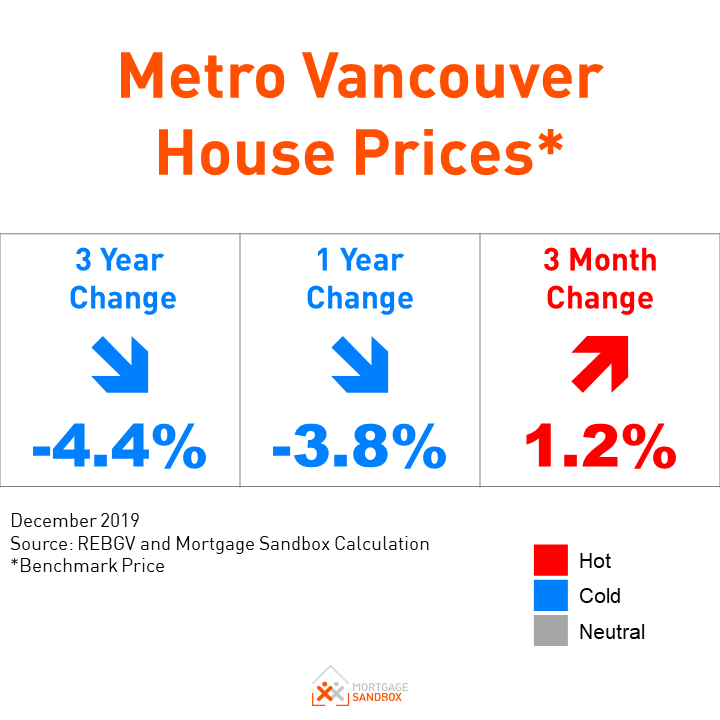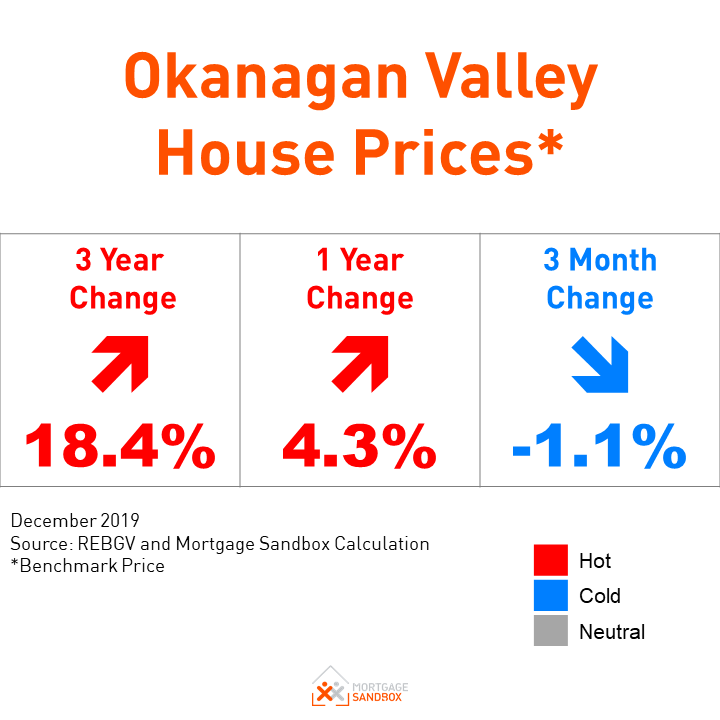2020 Metro Montreal Forecast
HIGHLIGHTS
|
This article covers:
Where are Metro Montreal prices headed?
What factors drive the price forecast?
Should investors sell?
Is this a good time to buy?
1. Where are Metro Montreal home prices headed?
Home Price Overview
The bad news (for buyers) is that in the past year prices have risen significantly faster than incomes. Prices rose consistently upward throughout 2019 and barely responded to the forces at play in a traditional seasonal real estate cycle. People planning to sell their home will take heart in the fact that waiting one year will have earned them a high rate of return. House prices are still breaking records.
In this section, we review recent price trends for houses, townhouses and condos in Montreal and then share a forecast developed with input from a range of leading Canadian forecasters. If you would like to skip the current trends, you can scroll ahead to the 2021 Metro Montreal Home Price Forecast.
Metro Area Detached House Prices
Are Montreal house prices falling? Not at all. Not in any of the Montreal sub-markets either.
In 2019, benchmark Metro Montreal house prices rose closer to $400 thousand with a smooth trend-line. Long-term median prices are more reveal that often a deal can be found in autumn.
The federal, provincial and municipal governments are looking at measures to cool the market and bring about a “soft landing” but they have been vague in defining the type of soft landing they are targeting. Likely they are seeking price growth in the range of 1 to 3% annually – in line with income growth.
Metro Montreal Condo Apartment Prices
Metro Montreal apartment prices have skyrocketed since 2017, not quite as dramatically as Metro Toronto but impressive nevertheless. Today, the benchmark Metro Montreal condo is still affordable without help from the bank of mom and dad.
Metro Montreal Townhouse Prices
Still a challenge for first-time homebuyers
Montreal house prices have become even less affordable but not close to as bad as Metro Vancouver where the benchmark price of a house is $1.4 million.
A first-time homebuyer household earning $52,500 (the median Metro Montreal household before-tax income) can get a $150,000 mortgage. That’s not enough to buy a benchmark priced condo without a significant gift from mom and dad. For first-time homebuyers, a Montreal starter-home is not achievable.
What about the rest of Canada?
Read the Toronto Real Estate Forecast, Montreal Forecast and the Metro Vancouver Forecast.
2021 Metro Montreal House Price Forecast
At the beginning of 2019, Royal LePage predicted Montreal homes prices would rise 6% and the Quebec Federation of Real Estate Boards (QFREB) predicted house prices would rise only 3 to 4%. In the end, a benchmark Metro Montreal house gained 9% and condo apartments rose 11%. The forecasters were too conservative.
The best markets were for houses on the Island of Montreal which rose 12% and condos in Vaudreuil-Soulanges which gained 21 per cent!!! The weakest house market was the North Shore where house values only rose 3.5% and Laval where apartments barely reached 1% price growth. The difficulty with forecasts is that real estate is local and property type matters.
For 2020, we expect Metro Montreal to experience a greater degree of seasonal price variations that are reflective of a more balanced market. The average of the forecasts used in our analysis predicts a modest rise of 5% in 2020 and 4% in 2021. The lowest forecast predicted price growth of 3% and the most optimistic called for an 8% price appreciation.
There is still a pile of risks that could derail the market.
At Mortgage Sandbox, we provide a price range rather than attempting a single prediction because there are many risks in real estate that can impact prices. Risks are events that may or may not happen so as a result, we review a variety of forecasts from leading lenders and real estate firms and we present the most optimistic forecast, the most pessimistic forecast, and the average forecast. Want to learn more about real estate risk? We’ve written a comprehensive report that explains the level of risk in the Canadian real estate market.
Our forecast inputs:
2. What factors drive the price forecast?
Mortgage Sandbox 5 Factor Framework
At the highest level, supply and demand set house prices and all other factors simply drive supply or demand. At Mortgage Sandbox, we have created a five-factor framework for gathering information and performing our market analysis. The five key factors are affordability, capital flows, government policy, supply, and popular sentiment. Below we will summarize how the five factors result in the current forecast for prices in Metro Montreal.
Affordability
Affordability is a function of:
Home Prices: The current market value of the desired home.
Savings-Equity: How much disposable after-tax income you’ve been able to squirrel away plus any equity you have in your existing home.
Financing: This is driven by income levels (i.e., how much money you can put toward mortgage payments) and interest rates (how big are the mortgage payments).
How have these changed lately?
Home prices: Prices in 2020 are higher than the prior-year depending on where the home is located and what type of home it is. Of course, higher prices reduce affordability and add downward pressure on prices.
Savings-Equity: With rents rising at 3.6% (faster than incomes), first-time buyers will struggle to come up with down payments. However, since homes prices have risen, most homeowners seeking to upgrade will have more home equity going in 2020 than they did in 2019.
Financing: Median incomes have not changed materially but mortgage qualifying interest rates have dropped 9% since 2018. In 2019, lower interest rates were a major factor driving home prices but in 2020 mortgage qualifying interest rates are expected to rise, so we expect affordability to suffer toward the end of 2020 and this would put some downward pressure on prices.
Over the course of 2019, prices have risen but people can borrow more so the net effect on affordability was neutral but in 2020 the combination of rising home prices and rising interest rates along with low savings will put downward pressure on prices
Capital Flows
These represent short-term investment, long-term investment, and recreational demand (i.e., not occupied full-time by the owner). Here is where foreign capital, real estate flippers, and dark money come into play. It also includes short-term rentals, long-term rentals, and recreational property purchases.
Capital inflows raise demand and put upward pressure on prices while capital outflows have the opposite effect. If capital sits invested in real estate nothing is bought or sold, it has no effect on the direction of prices.
Foreign capital inflows are a major influence in Vancouver and Toronto but are less of a concern in Montreal because only 23 percent of newcomers living in the Greater Montreal Area buy a home. One of the lowest rates of newcomer homeownership in Canada.
Montreal also hasn’t seen rampant house flipping. To provide a comparison, Vancouver had very high levels of house flipping activity before the financial crisis then it dropped dramatically. It picked up again in 2016-17 and then declined again in 2019 because it’s difficult to profitably flip homes with quick renovations when the value of the land value is dropping. The chart below shows the changes in Metro Vancouver and we would like to provide a similar one for Montreal but it’s difficult to find an equivalent analysis for Montreal.
As it relates to our analysis, we expect local interest in rental income properties is unchanged.
It is common knowledge that transnational crime syndicates move Canadian real-estate prices in money-laundering havens like Toronto, Vancouver and Montreal. B.C. has implemented a Corporate Beneficial Ownership Registry that comes into effect in May of 2020 but Ontario and Quebec have not taken steps to shine a light on murky real estate transactions. If Vancouver money-laundering shifts to Montreal and Toronto then perhaps policy in Western Canada will indirectly affect capital flows to Montreal but it’s too soon to tell. We see no evidence of a change in role for dark money in local real estate.
Going forward, we expect very little change to the capital flowing into Quebec’s real estate.
Government Policy
There has been a lot of policy aimed at housing in recent years but we are mostly concerned with any recent changes that impact the real estate market. Changes made in 2018 and earlier are pretty much already “baked-in”.
In September 2019, the federal liberals created the First-Time Home Buyer Equity Incentive to help people purchase their first home. Under the program, the government offers to put in equity worth 5% or 10% of the home’s purchase price. It is difficult to qualify and it has a lot of strings attached so we expect it will have little effect in the Metro Montreal market.
The stress test implemented in 2018 effectively reduces the amount home buyers can borrow by 20% and its short term impact has been fully absorbed in home prices.
Tenants' rights advocates are calling on Quebec to put a cap on rent increases. The government has not changed anything yet but if this were to happen it would reduce investment in renovating and building new rental buildings.
The City Of Montréal has begun consultations on a bylaw that would mandate 20-20-20 On Social, Affordable And Family Housing. It will be adopted in 2020 and it will come into force in January 2021. This may encourage developers to seek city building and development approvals in 2020 and that may bring some development forward that would have otherwise occurred in 2021 or 2022. If this happens, it will bring a glut of pre-sales to the Montreal market in 2020 and that will have a strong downward influence on apartment prices.
Up until now, the desired effect of the municipal and federal policies is to reduce unnecessary demand until more supply can come to the market. The Montreal government is focused on trying to make developers build social and affordable supply but by raising the costs of and reducing the profit of building homes they may inadvertently reduce supply. If governments fail to moderate prices, then we should expect more policy interventions and more price uncertainty.
For 2020, the risk of a rush to pre-sell developments in advance of stringent new development policies could seriously impact prices as developers push hard to get home buyer’s commitments and leave sellers of older existing properties playing catch-up.
Supply
Supply comes from two sources.
Existing sales: Homes owned by individuals who sell them to upgrade, to move for work, or for some other reason. This is the primary source of detached houses since relatively few new detached houses are being built in Metro Montreal. Only existing home sales are reported by the real estate board.
Pre-Sales and Construction Completions: Usually, up to 70% of new homes are sold via pre-sales before the construction is completed. These are predominantly apartments and townhomes. Data on pre-sales is private and more difficult to find whereas home completions are reported by the government.
Months of Supply of Existing Homes
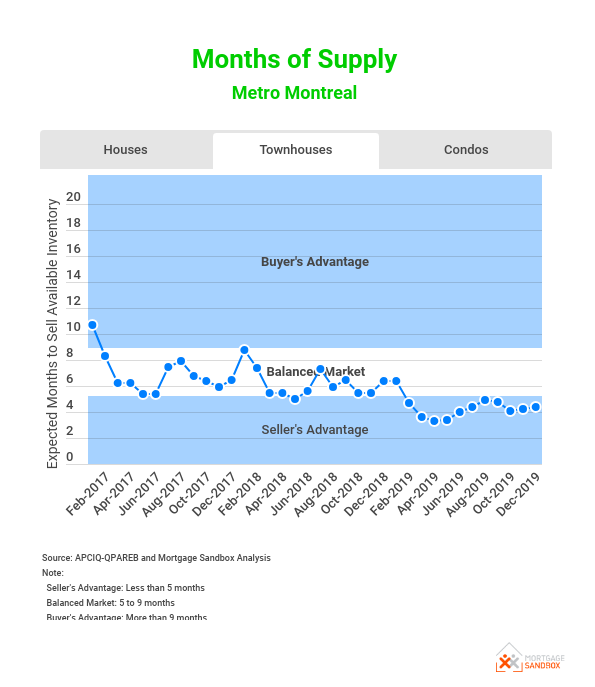
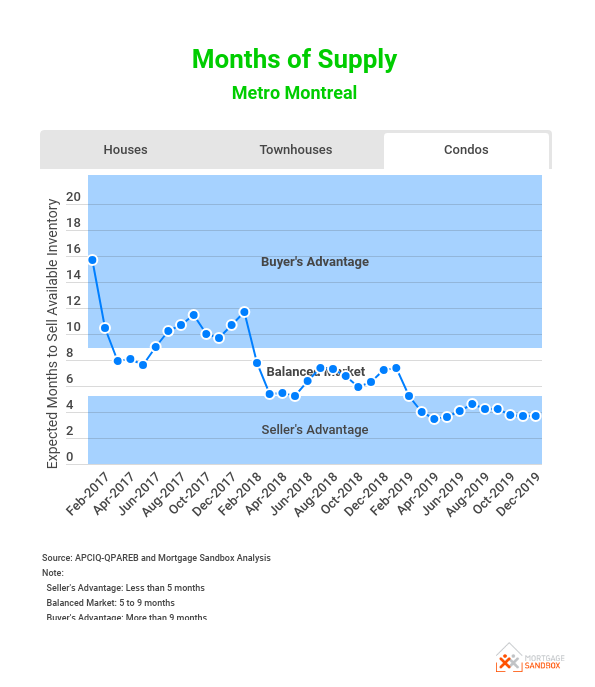
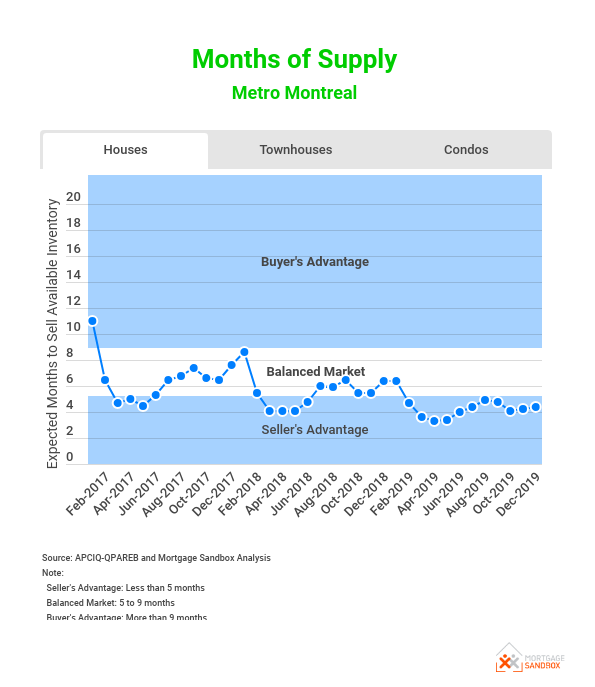
In recent months, sales have broken records but the true driver of price increases has been a lack of active listings. The number of people willing to sell their homes declined dramatically in 2019. This seems to be driven by market sentiment and the net effect is that the balance between purchases and listings is trending toward a seller's advantage and that means prices will continue trending upward in the near-term. In a seller’s market, sellers can leverage the lack of supply to resist providing discounts and incentives. Toronto style bidding wars and no-subject offers may become more common in Montreal as life gets a little more stressful for buyers.
Baby Boomers Downsizing?
In 2020, 45% of baby boomers will be aged 65 and over and, according to a recent survey, 27 percent of Quebec Boomers plan to move into a smaller home as they near or enter their golden years. A recent report on all Canadian Boomers from RBC says, “Over the coming decade, we expect baby boomers to ‘release’ half a million homes they currently own—the result of the natural shrinking of their ranks, and their shift to rental forms of housing, such as seniors’ homes, for health or lifestyle reasons.”
As baby boomers begin downsizing and list their half-million-dollar homes for sale they will add supply in what is considered the luxury market. If not enough Gen-X and millennial buyers can be found for these expensive homes, there is a risk that this may depress prices at the top of the market, which will then compress prices for townhomes and condo apartments.
In the near-term supply is tight, but in the medium-term, there are risks of higher than expected supply.
Pre-sales and Completions
New Construction: There is a record number of housing starts, homes under construction and building completions. Most of the homes under construction will compete in 2020 and 2021. As these buildings complete, and people move out of their rental or sell their current home, this new supply should alleviate some of the pressure in the market.
Pre-sales: Pre-sales, which are purchases of brand-new homes from developers, have trended up substantially. The strong construction starts in Montreal imply that pre-sales are hot and are absorbing some of the demand in the market. As well, the proposed new City of Montreal 20-20-20 policy will create an incentive for any developer who is holding land to rush their approvals forward.
Popular Sentiment
Buyers who were sitting on the sidelines are now springing into action and many sellers are waiting because they believe they can get a better price in 1 year. The combination of high demand and low supply is catapulting prices higher. Demand is difficult to control but if people begin to get cold feet (like they did in Toronto in 2017) or if a large wave of pre-sale homes is released, then the market could tilt back into balance. There’s no way of predicting seller sentiment but, as witnessed in 2008 and 2017, sentiment can shift quickly.
3. Should Investors Sell?
From a seller’s perspective, there are more changes in the market that influence prices downward so now may be a better time to sell than in two years and the seasonal real estate cycle usually favours sellers in the first half of the year.
Sellers should always consult a mortgage broker early to prioritize flexible loan conditions and reduce the risk of mortgage cancellation penalties. Find out more about the benefits of a mortgage broker.
4. Is this a good time to buy?
With accelerating prices, homebuyers that took a cautious wait-and-see approach in 2019 have been penalized. With prices continuing to trend upward, 2020 definitely appears to be a favourable time to buy. Looking forward to 2021, prices may be higher or lower but they are unlikely to rise as dramatically as they did in 2016 and 2017. Also, keep in mind that the seasonal real estate cycle usually favours buyers in late summer.
If you are thinking of buying just be sure to drive a hard bargain and pay as close to market value as you can. As well, when it comes to financing, don’t bite off more than you can chew.
Buying a home is a big decision, so check out Mortgage Sandbox’s Canadian Homebuyer Guide so we can walk you through the end-to-end process and get you ready to buy your new home!
Here are some recent headlines you might be interested in:
Real estate: Montreal one of Canada’s hottest markets for luxury homes (Montreal Gazette)
'Montreal is sexy' and its housing market is expected to break records in 2020 (Montreal Gazette)
City Of Montréal Publishes Bylaw 20-20-20 On Social, Affordable And Family Housing (Mondaq)
Why Criminals Love Canadian Real Estate (Transparency International)
Housing data reveals ‘growing divergence’ between eastern and western Canada (Global News)
Canada’s Risky Housing Market Has Traded Places With The U.S., IMF Says (Huffpost)
Like this report? Like us on Facebook.











